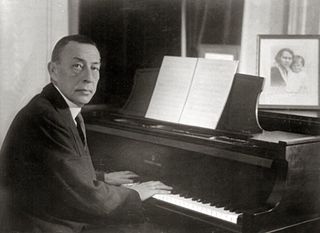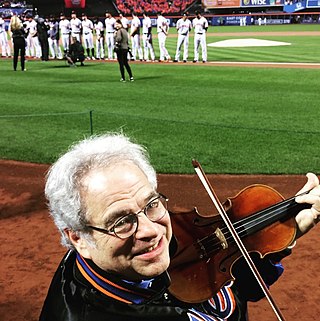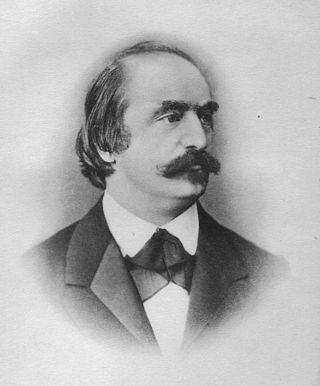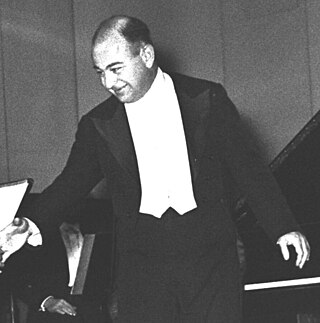Related Research Articles

A pianist is a musician who plays the piano. A pianist's repertoire may include music from a diverse variety of styles, such as traditional classical music, jazz, blues, and popular music, including rock and roll. Most pianists can, to an extent, easily play other keyboard instruments such as the synthesizer, harpsichord, celesta, and the organ.

Romantic music is a stylistic movement in Western Classical music associated with the period of the 19th century commonly referred to as the Romantic era. It is closely related to the broader concept of Romanticism—the intellectual, artistic, and literary movement that became prominent in Western culture from about 1798 until 1837.

Anchors Aweigh is a 1945 American musical comedy film directed by George Sidney, starring Frank Sinatra, Kathryn Grayson, and Gene Kelly, with songs by Jule Styne and Sammy Cahn. The film also features José Iturbi, Pamela Britton, Dean Stockwell, and Sharon McManus.

Itzhak Perlman is an Israeli-American violinist. He has performed worldwide and throughout the United States, in venues that have included a state dinner for Elizabeth II at the White House in 2007, and at the 2009 inauguration of Barack Obama. He has conducted the Detroit Symphony Orchestra, the Philadelphia Orchestra, and the Westchester Philharmonic. In 2015, he was awarded the Presidential Medal of Freedom. Perlman has won 16 Grammy Awards, including a Grammy Lifetime Achievement Award, and four Emmy Awards.

Eduard Hanslick was an Austrian music critic, aesthetician and historian. Among the leading critics of his time, he was the chief music critic of the Neue Freie Presse from 1864 until the end of his life. His best known work, the 1854 treatise Vom Musikalisch-Schönen, was a landmark in the aesthetics of music and outlines much of his artistic and philosophical beliefs on music.

Freiherr Hans Guido von Bülow was a German conductor, virtuoso pianist, and composer of the Romantic era. As one of the most distinguished conductors of the 19th century, his activity was critical for establishing the successes of several major composers of the time, especially Richard Wagner and Johannes Brahms. Alongside Carl Tausig, Bülow was perhaps the most prominent of the early students of the Hungarian composer, virtuoso pianist and conductor Franz Liszt; he gave the first public performance of Liszt's Sonata in B minor in 1857. He became acquainted with, fell in love with and eventually married Liszt's daughter Cosima, who later left him for Wagner. Noted for his interpretation of the works of Ludwig van Beethoven, he was one of the earliest European musicians to tour the United States.
Sonata form is one of the most influential ideas in the history of Western classical music. Since the establishment of the practice by composers like C.P.E. Bach, Haydn, Mozart, Beethoven, and Schubert and the codification of this practice into teaching and theory, the practice of writing works in sonata form has changed considerably.
The "War of the Romantics" is a term used by some music historians to describe the schism among prominent musicians in the second half of the 19th century. Musical structure, the limits of chromatic harmony, and program music versus absolute music were the principal areas of contention. The opposing parties crystallized during the 1850s. The most prominent members of the conservative circle were Johannes Brahms, Joseph Joachim, Clara Schumann, and the Leipzig Conservatoire, which had been founded by Felix Mendelssohn. Their opponents, the radical progressives mainly from Weimar, were represented by Franz Liszt and the members of the so-called New German School, and by Richard Wagner. The controversy was German and Central European in origin; musicians from France, Italy, and Russia were only marginally involved.

Shura Cherkassky was a Russian-American concert pianist known for his performances of the romantic repertoire. His playing was characterized by a virtuoso technique and singing piano tone. For much of his later life, Cherkassky resided in London.
"Decomposing Composers" is a Monty Python comedic song released on Monty Python's Contractual Obligation Album and the Monty Python Sings album. It was written and composed by Michael Palin and arranged by John Du Prez.

Peter Roy Katin was a British classical pianist and teacher.

Otto Singer was a German musician also active in the USA. He is best known for his piano transcriptions of orchestral works, include symphonies by Beethoven, Brahms, Bruckner, Mozart and Tchaikovsky.

The New German School is a term introduced in 1859 by Franz Brendel, editor of the Neue Zeitschrift für Musik, to describe certain trends in German music. Although the term has frequently been used in essays and books about music history of the 19th and early 20th centuries, a clear definition is complex.
Thematic transformation is a musical technique in which a leitmotif, or theme, is developed by changing the theme by using permutation, augmentation, diminution, and fragmentation. It was primarily developed by Franz Liszt and Hector Berlioz. The technique is essentially one of variation. A basic theme is reprised throughout a musical work, but it undergoes constant transformations and disguises and is made to appear in several contrasting roles. However, the transformations of this theme will always serve the purpose of "unity within variety" that was the architectural role of sonata form in the classical symphony. The difference here is that thematic transformation can accommodate the dramatically charged phrases, highly coloured melodies and atmospheric harmonies favored by the Romantic composers, whereas sonata form was geared more toward the more objective characteristics of absolute music. Also, while thematic transformation is similar to variation, the effect is usually different since the transformed theme has a life of its own and is no longer a sibling to the original theme.
Although Franz Liszt provided opus numbers for some of his earlier works, they are rarely used today. Instead, his works are usually identified using one of two different cataloging schemes:
Josef Bulva was a Czech pianist.

Pyotr Ilyich Tchaikovsky struggled with sonata form, the primary Western principle for building large-scale musical structures since the middle of the 18th century. Traditional Russian treatment of melody, harmony and structure actually worked against sonata form's modus operandi of movement, growth and development. Russian music—the Russian creative mentality as a whole, in fact—functioned on the principle of stasis. Russian novels, plays and operas were written as collections of self-contained tableaux, with the plots proceeding from one set-piece to the next. Russian folk music operated along the same lines, with songs comprised as a series of self-contained melodic units repeated continually. Compared to this mindset, the precepts of sonata form probably seemed as alien as if they had arrived from the moon.
Musical quotation is the practice of directly quoting another work in a new composition. The quotation may be from the same composer's work (self-referential), or from a different composer's work (appropriation).
Mikhail Rudy is a French pianist, who has won several awards for his recordings including the Grand Prix du disque.
References
- ↑ "The 16th Academy Awards (1944) Nominees and Winners". oscars.org. Archived from the original on July 6, 2011. Retrieved August 14, 2011.
- ↑ "New York Times: Heavenly Music". Movies & TV Dept. The New York Times . Baseline & All Movie Guide. 2011. Archived from the original on May 20, 2011. Retrieved May 18, 2008.